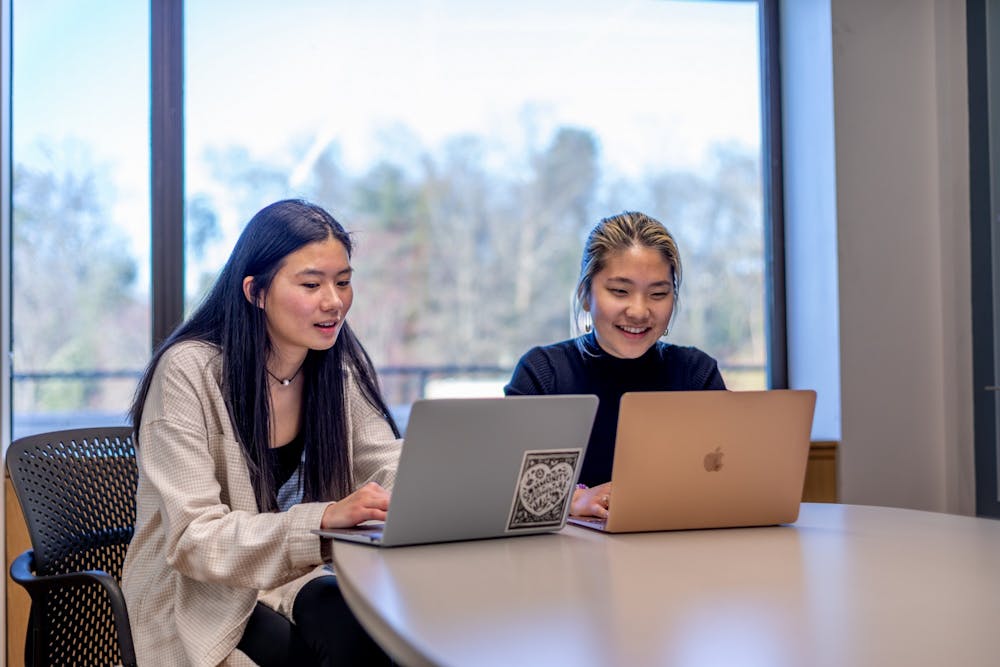The University’s newest literary publication, {in}Visible Magazine, joins the storied literary arts scene on Grounds. What sets {in}Visible Magazine apart from other student-led publications is that it is the first literary magazine to center around Asian Pacific Islander South Asian/American identities.
Jasmine Wang, co-founder of {in}Visible Magazine and second-year College student, expressed her desire for the magazine to help forge bonds between people of similar identities.
“We started {in}Visible Magazine kind of as a way to build community but also where you can explore your Asian identity and APISAA identity,” Wang said. “But also to kind of expand what it means to be APISAA.”
The founding of {in}Visible Magazine began with an email that Wang found in her inbox in January. As a writer for Iris Magazine, a publication at the Maxine Platzer Lynn's Women’s Center, Wang had written a piece centered around her mother and APISAA identity. Wendy Gao, co-founder and third-year College student stumbled upon the article and contacted Wang about starting an APISAA literary publication for University students.
Wang was thrilled to hear from another student like herself who shares a passion for writing and uplifting APISAA voices around Grounds. When she saw the email from Gao, a spark ignited inside of her.
“I immediately said yes,” Wang said. “I remember running to my parents and [saying], ‘Look how cool this is!’ I was so immediately excited about it. We started texting about it — I feel like we hit the ground running very quickly.’”
Gao described how she aims to create a space at the University for people of APISAA identities to creatively express themselves. Wang and Gao seek to fill a void for students like themselves to write since there are no publications at the University that specifically highlight APISSAA stories and experiences.
Gao and Wang’s vision for the magazine prizes the written word as its primary form of expression as opposed to other methods of celebrating APISAA culture because they find writing to be a powerful way of exploring oneself and understanding one’s identity.
“It really is to offer creative space for APISAA-identifying students at U.Va. to explore their APISAA identities through written and creative pieces,” Gao said. “I think writing is such an important medium for thinking through identity issues, and there really isn’t a place for APISAA students to do that yet.”
Second-year College student Ploi Sripoom is one of those students seeking an avenue to make her voice heard and connect with her community. Sripoom knows Gao and Wang personally and decided to become a writer once she heard about the magazine they were launching.
As a passionate writer and self-proclaimed advocate for her community, Sripoom had been disappointed at the lack of places for her to express her identity through writing. Sripoom acknowledged the valuable work some other APISAA organizations have provided and hopes to shed light on the APISAA experience to the greater University community through writing for {in}Visible Magazine.
“I also love writing and sharing my stories,” Sripoom said. “[I hope] there will be more people from other communities reading it and we could help spread some awareness on some problems or issues that the Asian community is facing.”
Like Sripoom, Gao envisions the magazine as more than just a space for writers to exhibit their work. Instead of it being only a creative outlet, she emphasized the importance of having a publication that is solely dedicated to supporting APISAA identities — highlighting common experiences among people belonging to this group. Each issue of the magazine will have a guiding theme for writers to focus on when they submit their work for publication.
“So many APISAA identities and experiences share very common themes like diaspora — and, for example, memory figures very heavily in a lot of identity building for APISAA individuals,” Gao said. “I think it’s really useful to have a central place for people to submit their work and explore these issues through writing.”
In the future, the organization wants to expand in order to do more for the APISAA community as well as enrich the existing literary culture on Grounds with their publication. Gao stressed the significance of not only spotlighting one group like APISAA but of strengthening connections between different parts of the University community as a whole.
“There's so much that can be explored, and so much connection occurs through writing,” Gao said. “I think it would be really cool for {in}Visible to do collaboration events that would really help build coalition and community across student groups on Grounds.”
Wang and Gao have started going through student submissions and plan to release their first issue March 13. As they establish their Executive Board and release more issues throughout the semester, they hope to gain CIO status next fall. For the time being, the publication is solely digital, but they have discussed expanding with print issues later on. Nevertheless, its presence still provides a space for the APISAA community, and Wang expressed her excitement around publishing creative work in this setting.
“There's such a joy in sharing your work and gushing over each other's work and being like, ‘I love this line,’” Wang said. “There's this kind of love between writers that's so exciting to me, and it's so warm, and I'm really excited to build that with {in}Visible.”
CORRECTION: A previous version of this article mischaracterized Sripoom's work and perception of another Asian-American group on Grounds. The updated version removes the mention of the other organization.







